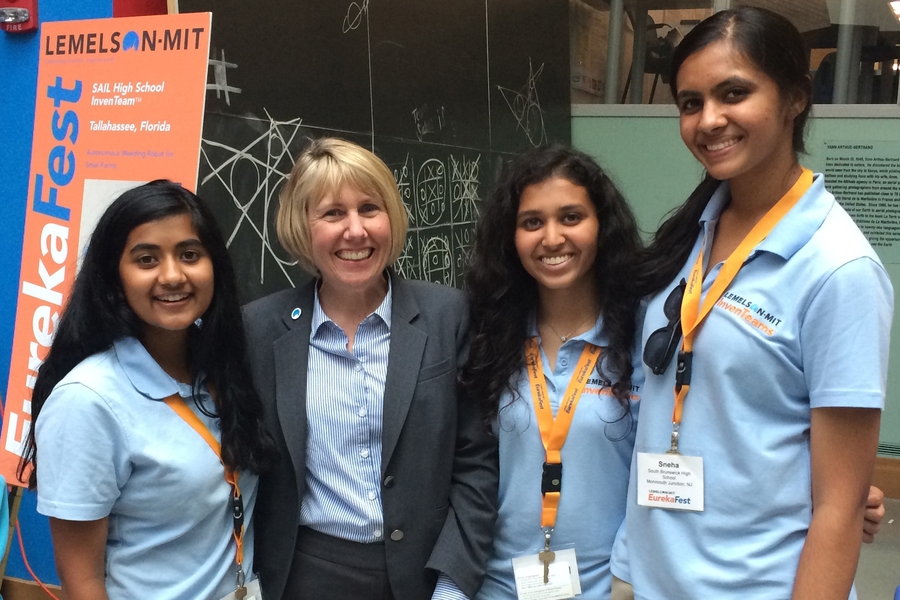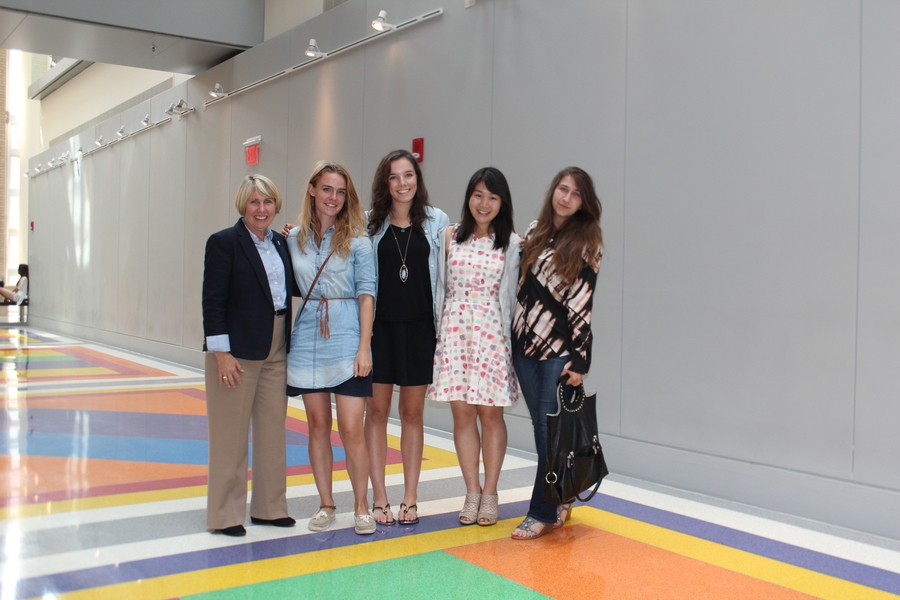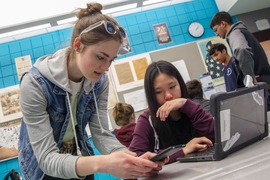Leigh Estabrooks, the invention education officer at the Lemelson-MIT Program, was recently awarded the Society of Women Engineers (SWE) 2020 WE Local Engaged Advocate Award in her home state of North Carolina. Estabrooks received the award for her contributions to the advancement of women in engineering. She has engaged young women in the fields of science, technology, engineering, and math (STEM) through inventing over the past 15 years at the Lemelson-MIT Program, part of MIT’s School of Engineering.
“I invent inventors,” says Estabrooks when asked about her role as the invention education officer. “I try to help students understand that ‘inventor’ isn't an elite status, and that all kids, all students can invent — including female students. I am honored to receive this award from SWE and will continue working hard to encourage girls to consider inventing solutions to help others.”
The Lemelson-MIT Program promotes invention and its societal benefits through a prize program for collegiate inventors, a grants initiative for teams of high school students, invention curriculum for middle school students, invention resources, and professional development for teachers. The program is led by Faculty Director Michael J. Cima, the associate dean of innovation for the School of Engineering, co-director of the MIT Innovation Initiative, and the David H. Koch Professor of Engineering. Estabrooks oversees all K-12 invention education initiatives, including the InvenTeams grants initiative for high school students, and develops, pilots, and scales educational offerings that compel K-8 students to consider invention as a way to help improve the lives of others.
Estabrooks says the first step to encouraging students to think like inventors is to help them develop confidence in themselves and give them the freedom to solve problems of their own choosing. When kids identify a challenge in their local community that is meaningful to them, inventing a solution becomes a personal, driving force that encourages students to be fearless self-learners.
“On top of everything else that a student is doing, inventing takes many hours,” says Estabrooks. “It's after-school work. It's weekend work. That’s why being invested in the problem is so important. Students are more likely to persevere when people in their very own family or community may be able to benefit from their hard work to invent a solution to their problem.”
Estabrooks notes that inventing is vital to our economy. Along with Lemelson-MIT Executive Director Stephanie Couch, Estabrooks has written and published research on the emerging field of invention education and its importance in the United States. Estabrooks says that the students who have been part of Lemelson-MIT’s InvenTeams, “are doing amazing things like integrating computational thinking, coding, and computer science with microelectronics as they invent within the context of the internet of things.”
Honing these types of skills throughout the invention process gives high school students the ability to tackle pressing challenges in today’s technological world. The U.S. economy has the potential to benefit when students go on to patent their inventions or become entrepreneurs who build companies to bring their inventions to the market. Nine InvenTeams to date have received U.S. patents for their inventions. MIT alumna Katelyn Sweeney '18 is an example of a 2012 InvenTeam member who is an inventor on a patent. Sweeney was mentored by Estabrooks and now builds economic and social value working in the development group as a mechanical engineer for a global communications company.
Many of the high school girls that Estabrooks works with have had little exposure to STEM enrichment opportunities prior to InvenTeams. Estabrooks noticed the need to implement invention education programing in earlier grades. Lemelson-MIT’s JV InvenTeams activity guides were derived out of this need. A growing number of these guides, which include theme-based invention curriculum that focuses on the hands-on and minds-on aspects of inventing for middle school students, are available on the Lemelson-MIT website for free download.
Currently, Estabrooks is reaching even younger female students through an afterschool program at Fletcher Maynard Academy, a public elementary school near MIT, with support from MIT’s Office of Government and Community Relations and a grant from the Abdul Latif Jameel World Education Lab (J-WEL). The J-WEL grant includes assistance from professor of mechanical engineering Maria Yang, graduate student Dextina Booker, and Evelyn Gomez '10. The team is teaching Stepping into Coding and Inventing through Toy Design to over 30 girls in grades 3 through 5. The girls, along with other K-8 students in Cambridge, Massachusetts, will present their inventions at the first local Invention Convention on April 25, a free event, open to the public.
Stephanie Couch says, “I am proud of Leigh for being recognized for her impactful and significant work in supporting and encouraging young women to invent and pursue STEM fields of study and careers. This recognition aligns with MIT’s ongoing commitment to create meaningful opportunities in K-12 STEM education for all students, and to prepare students for the future of work.”










